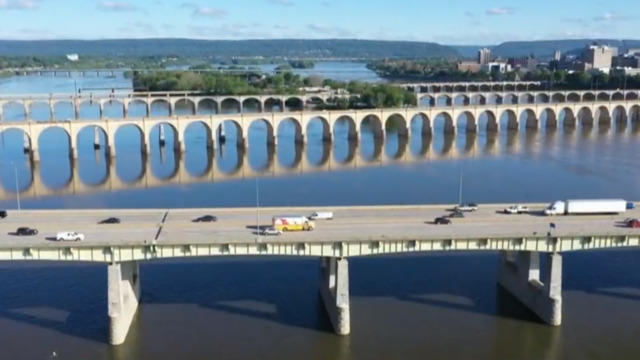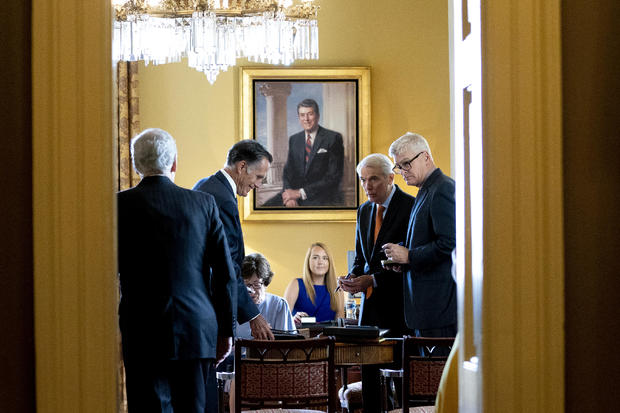▶ Watch Video: U.S. infrastructure crumbles as Congress debates plan
Washington — Five Republican senators negotiating the bipartisan infrastructure framework said Wednesday they have reached an agreement on the “major issues” of the bill with Senate Democrats and the White House, potentially capping weeks of talks that at times appeared on the brink of collapse.
Senator Rob Portman of Ohio, who has been leading negotiations for Republicans, announced the breakthrough after meeting with Senate Minority Leader Mitch McConnell and four other Republican senators. A vote to advance the measure would require 60 votes, meaning 10 Republicans would have to join all Democrats in voting to begin debate.
“We look forward to moving ahead and having the opportunity to have a healthy debate here in the chamber,” Portman told reporters. The Ohio Republican added that the text of the legislation still needed to be finalized.
The proposal, which is expected to include $550 billion in new spending, would prioritize funding for physical infrastructure, such as roads, bridges and broadband internet.
With word of the brokered deal, Senate Majority Leader Chuck Schumer said he planned to hold a procedural vote on advancing the measure Wednesday evening, bringing the upper chamber one step closer to approving one of President Biden’s key domestic priorities.
“Tonight, I’m intending to call a vote to move to proceed with the bipartisan infrastructure bill,” Schumer said Wednesday afternoon. “I believe we have the votes for that.”
Senator Kyrsten Sinema of Arizona, the lead negotiator for Democrats, told reporters she expects the measure to move forward Wednesday evening. She said she briefed Mr. Biden of the plans Tuesday and spoke with the president again Wednesday.
“We’re very excited to have a deal,” she said.
During a visit to Pennsylvania, Mr. Biden said he feels “confident” about the bipartisan deal.
“You may have heard that in Washington now, just on the phone, looks like they’ve reached a bipartisan agreement on infrastructure, a fancy word for bridges, roads, transit systems, high-speed internet, clean drinking water,” Mr. Biden told the crowd at an event touting American manufacturing. “And I’m working with Republicans and Democrats to get this done because while there’s a lot we don’t agree on, I believe that we should be able to work together on the few things we do agree on.”
Negotiations appeared to be in danger of collapsing earlier this week after Democratic negotiators sent a “global offer” to Republicans seeking to resolve some outstanding issues. That offer was rebuffed by Republican negotiators.
Republican Senator Lisa Murkowski of Alaska, a member of the bipartisan negotiating group, said she plans to vote to advance to debate over the bipartisan infrastructure package.
“I think that there is a strong solid number of folks on both sides of the aisle that want to get onto an infrastructure package,” Murkowski told reporters Wednesday.
The Alaska Republican told reporters after announcing the agreement that it shows bipartisanship is still possible in the nation’s capital.
“This is also important to demonstrate that Republicans and Democrats can come together for the really hard stuff to negotiate in good faith and to broker an agreement that is not going to work just for Republicans or Democrats,” she said. “It is going to work for the country. So, it has been a long effort and there will still be a long effort going forward.”
The core group of senators negotiating the package, which includes five Democrats and five Republicans, agreed to a framework with President Biden over a month ago. In the weeks since Mr. Biden and the bipartisan group announced that agreement, White House officials and the bipartisan group met to hash out details on how to pay for the proposal. In the last few days, the group worked to resolve issues regarding the nation’s public transit system and broadband infrastructure.
Last week, Schumer called an earlier procedural vote to begin debate over the bill, but Senate Republicans blocked the measure, saying they would not begin debate without the final legislative text.
The Democratic leader has insisted that the Senate must pass the bipartisan infrastructure bill and a $3.5 trillion budget resolution, which would start the reconciliation process on a separate package, before the Senate recesses in August. The budget resolution is a blueprint for Democrats to pass a major portion of Mr. Biden’s agenda without Republican support, and it is expected to include funding to combat climate change, expand Medicare and potentially reform the nation’s immigration system.
While the White House has stressed it wants to see both pieces of legislation proceed through Congress on dual tracks, Sinema appeared to complicate those efforts Wednesday, as she told the Arizona Republic she does not support the $3.5 trillion price tag for the more sweeping measure.
Under the procedure, legislation can pass the Senate with a simple majority. But with Democrats holding 50 seats there, the White House needs the backing of all Democratic senators for it to clear the upper chamber.
Sinema said in a written statement to the Arizona Republic that while she supports beginning the budget reconciliation process, “I do not support a bill that costs $3.5 trillion — and in the coming months, I will work in good faith to develop this legislation with my colleagues and the administration to strengthen Arizona’s economy and help Arizona’s everyday families get ahead.”
House Speaker Nancy Pelosi said during a press conference she is “rooting” for the bipartisan infrastructure bill to succeed, but reiterated she would not bring the measure to a vote on the House floor until the more sweeping $3.5 trillion measure passes the Senate.
Pelosi declined to commit to approving the Senate’s proposal without changing.
“I can’t commit to passing something that I don’t even know what it is yet. But I’m hoping for the best,” she said.



































